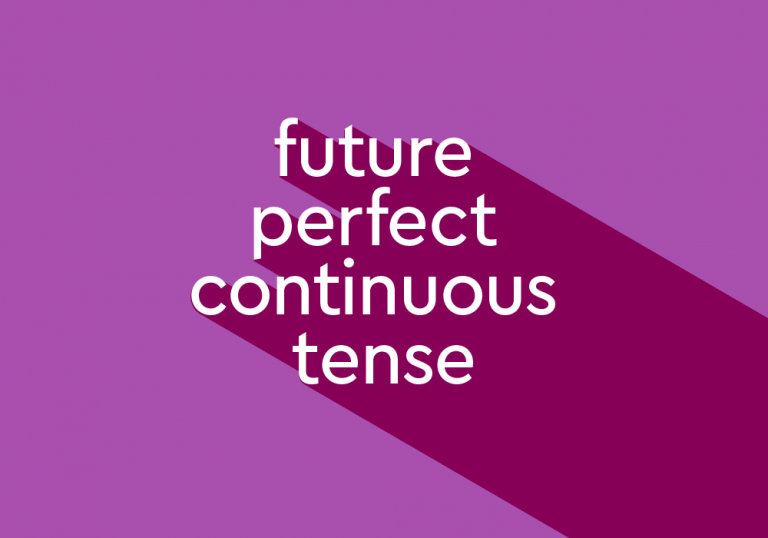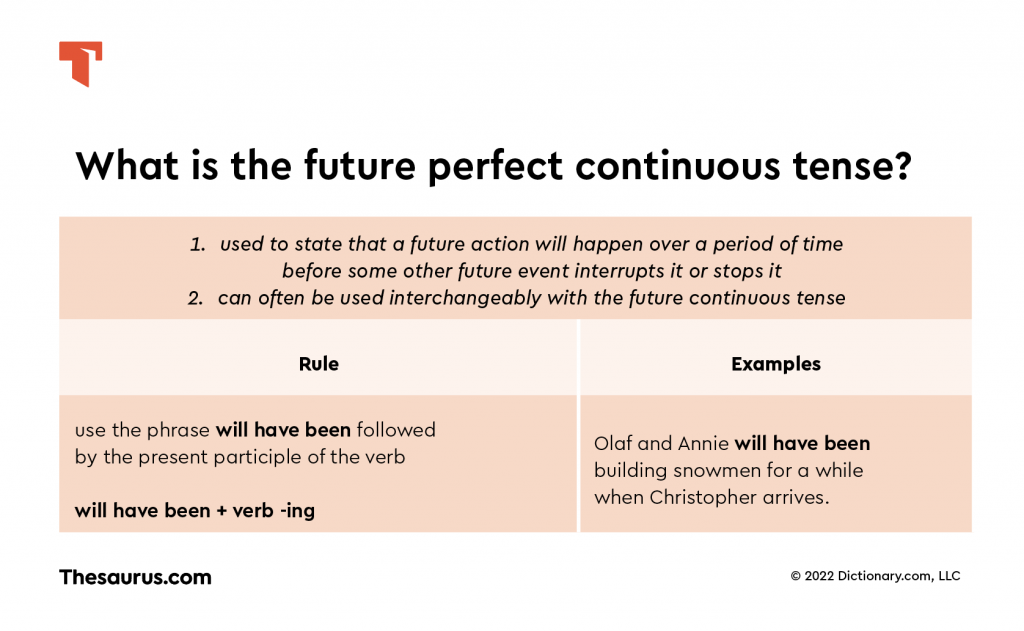Future Perfect Continuous Tense: Rules And Examples

We hope you’re ready for an important grammar lesson, because by the time you finish this article, you will have been reading plenty of examples of how to use a unique verb tense. In fact, you are about to learn a lot more about a neat way that we use verbs that just happened to appear in the last sentence. That is, we are about to enter a time machine and take a trip into the future. By the time we are done traveling through the future, we will have been examining verbs for enough time for you to become a grammar master!
So, let’s not waste anymore time and gaze into the future to learn about the future perfect continuous tense.
What is future perfect continuous tense?
Verbs refer to actions or states of being. When we use verbs in English, we have 12 different types of verb tenses to choose from. Put simply, the tense of a verb tells you when in time something happens. For now, let’s look at a verb tense that is quite the mouthful: the future perfect continuous tense.
Let’s break apart the name of this verb tense to understand what it is used for:
- Future: This verb tense refers to an action that happens in the future.
- Perfect: Generally speaking, perfect verb tenses refer to completed actions.
- Continuous: Continuous verb tenses refer to actions that continue over a period of time or are in progress.
Putting it all together, the future perfect continuous tense typically refers to an action that continues for some time before ending in the future. Here are examples of sentences that use the future perfect continuous tense:
- If I focus, I will have been studying for a few hours when you get here.
- In April, Ricardo will have been working here for 30 years.
When do you use future perfect continuous?
There are several common ways to use the future perfect continuous tense.
One of the main reasons that we use the future perfect continuous tense is to state that a future action will happen over a period of time before some other future event interrupts it or stops it. You can see examples of this in the following sentences:
- Olaf and Annie will have been building snowmen for a while when Christopher arrives.
- I think Freddy will be ready for the big show, because he will have been practicing his songs for weeks by the time he has to go on stage.
While the future perfect continuous usually refers to actions that end completely, it doesn’t have to. In the first example sentence above Annie and Olaf may still continue to build snowmen even after Christopher arrives.
For this reason, the future perfect continuous tense can often be used interchangeably with the future continuous tense as in the following two sentences:
- I will have been bathing my dogs all afternoon when you get home from work. (In some contexts, the sentence might omit the time element: I will have been bathing my dogs when you get home from work.)
- I will be bathing my dogs when you get home from work.
Learn more about the future continuous tense right here so you’ll be covered in the future.
Both of the two sentences above can mean the same thing: I will be in the middle of bathing dogs when you get home. However, only the tense used in the first sentence can also imply that I intend to stop bathing my dogs when you get home. This is the biggest reason to use the future perfect continuous tense over the future continuous tense: you want to imply that one action is going to end once something else happens.
While the action being described by the future perfect continuous tense can begin at any time, it must end in the future. If the action doesn’t continue into the future, we would instead use the present perfect continuous tense or the past perfect continuous tense:
- They will have been waiting for hours when the doctor gets here. (Can only end in the future.)
- They have been waiting for hours for the doctor to get here. (Might end in the present.)
- They had been waiting for hours when the doctor got there. (Ended in the past.)
Another reason we use the future perfect continuous tense is to say that one future event will cause another one. We often use the word because when we do this. For example:
- My poor dogs will have been chewing on the sofa all day because my brother forgot to feed them.
- When you see her, she will have been cramming for hours to prepare for her final exam tomorrow.
As with all continuous verb tenses, we typically do not use the future perfect continuous tense with stative verbs. Stative verbs (such as like, want, or believe) are used to refer to states of being so it usually doesn’t make sense to use them in a continuous tense. You can see this in the following sentence:
- By the time this country turns 100, the neighboring countries will have been existing for twice as long.
Instead, we typically use the future perfect tense:
- By the time this country turns 100, the neighboring countries will have existed for twice as long.
How to form future perfect continuous tense
In order to form the future perfect continuous tense, we use the phrase will have been followed by the present participle of the verb. The present participle is a form of the verb that ends in -ing. For example, the present participle of sleep is sleeping. The following sentences use verbs in the future perfect continuous tense.
- Zhen will have been listening to his uncle complain about gas prices for what seems like forever.
- Amazingly, the volunteers will have been dancing for a day straight by the time the event ends.
- If she manages to keep going, Ashley will have been making movies for 20 years by the time she turns 32.
We can also use contractions to make our sentences a bit shorter:
- When my friends arrive, I will have been babysitting my cousins all day.
- When my friends arrive, I’ll have been babysitting my cousins all day.
How to make future perfect continuous tense negative
To make the future perfect continuous tense negative, all you need to do is stick the word not in between the words will and have. The following sentences show the future perfect continuous tense used in the negative:
- As unbelievable as it may seem, Jamal will not have been playing tennis for even a year when he wins the championship match.
- If everything goes according to plan, you will not have been talking to the guards for five minutes before we swipe the diamond.
Again, we can use contractions to make our sentences a little shorter. Remember that the contraction of “will not” is won’t.
- Hopefully, I will not have been making a fool of myself when I see you at the party.
- Hopefully, I won’t have been making a fool of myself when I see you at the party.
All the verbs, none of the errors
A few months from now, you will have been using so regularly that your grammar and spelling will be flawless! (Yes, we are making a prediction with the future perfect continuous tense—just like you should be able to do after reading this article.) Using machine learning, Grammar Coach™ can spot the difference between the different verb tenses, their correct and incorrect uses—and much more! Its Synonym Swap will find the best nouns, adjectives, and more to help say what you really mean, guiding you toward clearer, stronger, writing.
Whether you’re writing in the past, present, or future, perfect grammar has never been easier.
